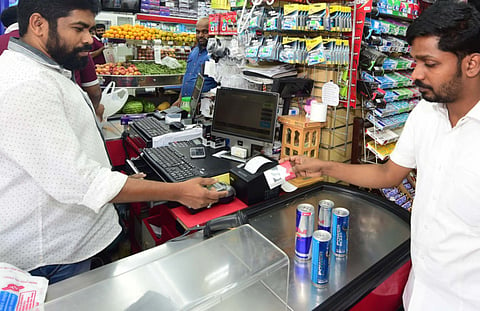Smokers hope UAE excise tax will help cut intake
Many smokers say tax will not necessarily make them quit, but will get them to review daily quota

Abu Dhabi/Dubai: Smokers in the UAE said they are likely to cut down but not quit the habit of smoking in view of the doubling of cigarette prices in the UAE from October 1.
With the Excise Tax law of 100 per cent being applied on tobacco and energy drinks, and 50 per cent on carbonated beverages, smokers who had failed to quit the habit after repeated attempts believe the tax is a blessing in disguise.
The main aim of the tax levy is to discourage the consumption of products that are detrimental to an individual’s health and to the environment. The revenues generated by the tax will go towards supporting advanced services for all members of society.
Speaking to Gulf News, UAE residents said the tax would pinch their pockets, but will not necessarily make them quit smoking instantly.
Jeffrey Casino, 35, a Dubai-based Filipino expat, said being a smoker for over ten years, it would be hard to quit smoking all at once. However, the extra dirhams he has to shell out will encourage him to cut down on the number of cigarettes he smokes per day.
“I smoke almost six packs a week, and each one costs around Dh10; so when the tax is implemented, I would probably have to either switch to a cheaper brand [of cigarettes] or reduce my regularity of smoking,” said Casino.
He believes that smoking less could possibly help him quit smoking altogether. But that’s some time away. “I will first have to replace my cigarettes with a e-cigarette, but I know it will be hard to quit.”
Another expat, from Egypt, was surprised to know that his two pack of cigarettes a day will start to cost Dh20 each.
“I will have to cut down on my cigarette consumption because it will become unaffordable,” said Karim Al Sheeirf, 25. “I don’t think the tax will make me quit smoking, neither do I think I will be switching to a cheaper brand because they say it’s unhealthy for the body.”
As a heavy smoker, Mohammad Sameeh from Palestine feels that the 100 per cent tax will coax him to gradually quit smoking and that he will anyway have to find a way to cut down on the number of packs he buys a day. “Smoking has affected my breathing and voice over the years. I have tried to quit the habit many times, but it didn’t work. My wife would be happy if I reduced my smoking. I think the tax is positive in a way, because people will start to think of quitting smoking,” said Sameeh, 28.
In Abu Dhabi, David S, from India, said that the tax on cigarettes would largely not affect him and that quitting smoking would be a personal choice rather than a financial one.
“Personally, I have always been trying to quit smoking, but I can’t say that [the tax] will now push me to quit. If I do end up quitting or even reducing [smoking], it will be more of a personal choice.
Affordability, said David, was a driving factor. “If a person is earning well, and can pay Dh100 a month [for cigarettes], I think they will be able to pay Dh200 a month too,” he added.
Bipin Singh, a Nepalese expatriate in Abu Dhabi believes the tax on cigarettes will definitely make him cut down on his smoking. “I smoke around two cigarettes a day and so I’ll be looking to cut that to one a day or even cut down totally because the expenses will add up in the end.” Shadi B, from Jordan, said that smoking was an addiction for many people, and that added costs would not deter regular smokers like him. “Most smokers will tell you that they have been trying to stop smoking for many years. I have tried quitting smoking on many occasions but never succeeded, and I don’t think that will change now because of the tax. I will just have to pay more now for my smoking habit.”
Average cost of cigarettes around the world
- UAE: Dh10
- USA: $6.16 (Dh22.63)
- UK: £9.91 (Dh46.63)
- India: Rs185 (Dh10.6)
- Pakistan: Rs145 (Dh5)
- Philippines: 73 pesos (Dh5.2)



